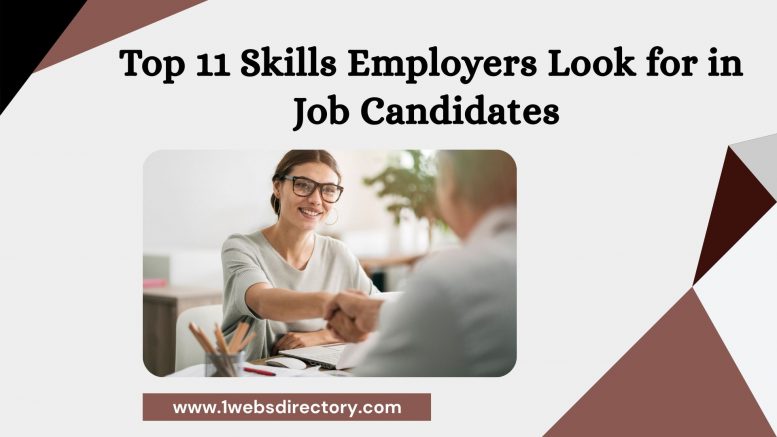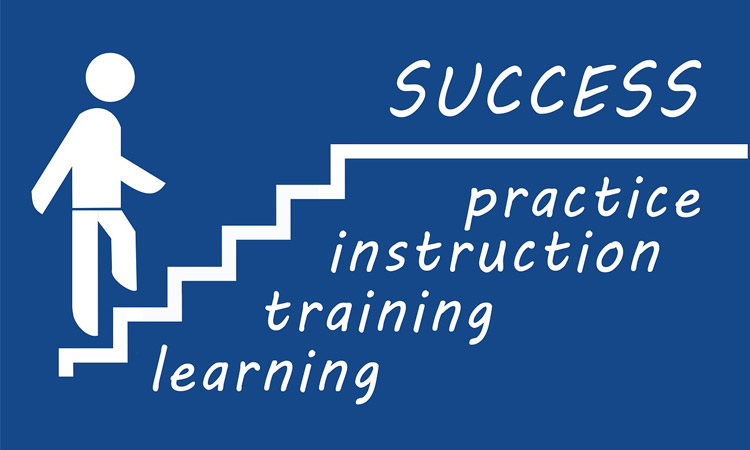In nowadays’s rapid-moving, tech-heavy, and aggressive paintings environment, employers are searching out lots more than just stages and task titles. Companies want nicely-rounded professionals who carry a mix of sensible know-how, people skills, and the pressure to preserve getting to know.
As organizations preserve to conform to hybrid paintings setups, include new technology, and depend greater on collaboration, the ability set in call for is evolving fast. Whether you’re a sparkling graduate or an skilled professional, knowing what means groups maintain to adapt to hybrid paintings setups, include new technologies, and depend extra on collaboration, the skill set in call for is evolving fast. Whether you’re a fresh graduate or an experienced expert, understanding what employer’s value can make all of the difference in landing and keeping a task in 2025 ployers value can make all of the distinction in touchdown and maintaining a process in 2025.
Let’s explore the top 11 in-demand skills employers are actively looking for along with real examples, tips to improve them, and ways to showcase them in your resume or interviews.
Top 11 Skills Employers Look for in Job Candidates (2025)
1.Communication Skills
Why it matters: clear and effective communication is the foundation of every role, whether you are writing emails, handling client calls, or leading a team.
What it includes:
- Speaking clear and confident
- active listening
- Writing emails, reports and documents
- Presentation
Real example:
A team leader infuses the project updates to stakeholders and helps the teammates understand their roles. A missed detail can cause delay or confusion.
How to improve:
- Join public speaking groups like Toastmasters
- Work on your business writing
- Record yourself and review how you explain ideas
How to showcase:
- Resume: “Led weekly cross-departmental meetings to streamline project timelines.”
- Interview: Share how you handled a communication gap at work and resolved it effectively.
2.Problem-Solving & Critical Thinking
Why it matters: Employers want people who don’t panic when problems arise but instead think calmly and find practical solutions.
What it includes:
- Analyzing situations
- Making logical decisions
- Thinking strategically
Real example:
An executive sees delays in delivery schedules. After reviewing routes and vendors, they reorganize logistics cutting delivery time by 20%.
How to improve:
- Practice problem-solving with real-life scenarios
- Learn from industry case studies
- Join group discussions where decisions are made collaboratively
How to showcase:
- Use the STAR method (Situation, Task, Action, Result) during interviews
- Highlight outcomes where your ideas made a difference
3.Adaptability & Learning Agility
Why it matters: With rapid changes in tools, platforms, and roles, employers want people who adjust quickly and keep learning.
What it includes:
- Embracing change
- Learning new tools/software
- Being open to feedback
Real example:
A marketer transitions from traditional methods to running Google Ads and Meta Ads within weeks, boosting campaign performance.
How to improve:
- Try new tools regularly
- Stay curious about industry changes
- Reflect on how you responded to recent changes
How to showcase:
- Resume: “Shifted from in-person sales to online strategy and increased reach by 40%.”
- Interview: Share a moment where you had to quickly learn something new on the job.
4.Leadership & Influence
Why it matters: Leadership is more about actions than titles. Taking charge, mentoring others, or driving change all show leadership.
What it includes:
- Inspiring teammates
- Resolving conflicts
- Delegating tasks effectively
Real example:
A senior developer helps a junior team member grasp complex code, boosting the entire team’s productivity.
How to improve:
- Volunteer to lead group projects
- Read leadership-focused books like Leaders Eat Last
- Ask for feedback on your leadership style
How to showcase:
- “Led a five-person team in launching a new feature ahead of schedule.”
- Share how you helped someone grow or solved a team-related challenge.
5.Team Work and Cooperation
Why it matters: no matter whether the job, you will be working with others, it is a person or remotely.
What does that involve?
- Evaluation of others’ ideas
- Supporting your peers
- Giving and obtaining creative response
Real example:
A cross-functional team of developers, markets and designers launched a new mobile app in less than 90 days and worked closely each role.
How to improve:
- Participate in group activities or voluntary programs
- Use collaboration equipment like Trailo or Slack
- Learn to react creatively
How to showcase:
- “Launched a new e-commerce platform with a six-member team on launching.”
- Mention how your team work leads to a specific business results.
6.Emotional Intelligence (EQ)
Why it matters: Emotional intelligence helps you stay calm under pressure, understand others, and build strong workplace relationships.
What it includes:
- Self-awareness and empathy
- Managing your emotions
- Handling conflict smoothly
Real example:
A customer support manager calmly handles an irate client, diffuses the situation, and retains the client—protecting the brand’s image.
How to improve:
- Practice mindfulness
- Reflect on emotional triggers
- Learn about empathy and body language
How to showcase:
- Talk about a tough situation you handled with maturity
- Share how you helped a colleague through a difficult time
7.Time Management & Organization
Why it matters: to make a lot of gathering, being organized means to work without burning or disappearing the deadline.
What does that involve?
- Plan your day
- Priority to works
- Completion of deadline
Real example:
A sales executive manages over 30 customer accounts, while continuously crosses the goals-thanks to the weighted time-enhanced strategies.
How to improve:
- Use tools such as perception, Google Calendar, or Todoist
- Break big tasks in daily goals
How to showcase:
- “Handled daily tasks for many projects, while missed deadline reduced to zero.”
- Mention your favorite productivity equipment and techniques
8.Work Ethic & Professionalism
Why it matters: Reliability, accountability, and professionalism are must-haves in any role.
What it includes:
- Showing up on time
- Taking responsibility
- Staying committed to quality
Real example:
A designer consistently delivers high-quality work ahead of deadlines—even while working remotely.
How to improve:
- Set high standards for yourself
- Reflect on areas you can be more consistent
How to showcase:
- Share examples of how you met or exceeded expectations
- Let references speak to your reliability
9.Digital Literacy & Tech Savviness
Why it matters: Almost every job now involves some digital tools. Being tech-friendly isn’t optional—it’s essential.
What it includes:
- Knowing basic tools like Excel, Google Docs
- Using industry-specific software
- Understanding how to work with automation or AI tools
Real example:
An HR manager uses an AI-powered platform to speed up hiring, reducing screening time by 50%.
How to improve:
- Take short courses on LinkedIn Learning
- Stay current with tech tools relevant to your field
How to showcase:
- List specific platforms you use
- Mention certifications or tools on your resume
10.Creativity & Innovation
Why it matters: New ideas drive progress. Whether it’s improving a process or launching a campaign, creative thinkers help businesses grow.
What it includes:
- Generating ideas
- Solving problems creatively
- Thinking outside the box
Real example:
A retail manager adds in-store QR experiences that increase customer engagement by 40%.
How to improve:
- Try creative hobbies like design or writing
- Study creative thinking methods like design thinking
How to showcase:
- Highlight a unique idea you implemented at work
- Use a portfolio if relevant (e.g., design, marketing, writing)
11.Curiosity & Willingness to Learn
Why it matters: With change being constant, people who keep learning are always a step ahead.
What it includes:
- Asking questions
- Exploring new ideas or skills
- Seeking self-improvement
Real example:
An IT professional completes a certification in Data Analytics and helps the team make smarter, data-based decisions.
How to improve:
- Set learning goals every quarter
- Read, watch, or listen to industry-related content
How to showcase:
- “Completed three online courses in the past year on project management and analytics.”
- Share how something you learned recently made a difference
Tips to Strengthen These Skills
- Create a personal development plan: Choose one ability to cognizance on every few months.
- Ask for regular feedback: It facilitates pick out blind spots.
- Build a simple portfolio: Show your work via blogs, displays, or initiatives.
- Stay connected to your field: Join webinars, study newsletters, or join forums.
How Employers Assess These Skills
- Behavioral interviews: “Tell me approximately a time whilst…” questions reveal soft skills and experiences.
- Simulated tasks or assignments: Real scenarios show the way you’d act within the position.
- Resume and project history: Employers search for real outcomes, not simply duties.
- Online presence: LinkedIn hobby, blogs, or aspect tasks can replicate your pastimes and gaining knowledge of journey.
Key Trends behind Skill Demand in 2025
- AI in the workplace: Knowing the way to paintings with technology now not fear it is vital.
- Remote/hybrid models: Self-subject, communique, and tech literacy count number greater than ever.
- Cross-functional roles: You would possibly put on many hats adaptability is prime.
- Ethical awareness: Companies are searching out folks that care about sustainability and doing the proper component.
Conclusion
The 2025 task landscape calls for extra than simply academic excellence or revel in. Employers are increasingly interested in individuals with a hybrid of technical abilties and human-centric talents people who aren’t only able of their roles however who can also lead, adapt, collaborate, and develop.
By that specialize in these 11 capabilities and integrating them into your expert profile, you increase your probabilities of status out in the task marketplace and thriving within the place of job of the destiny.
“Skills are the currency of the modern job market. Invest wisely.”




Be the first to comment on "Top 11 Skills Employers Look for in Job Candidates"